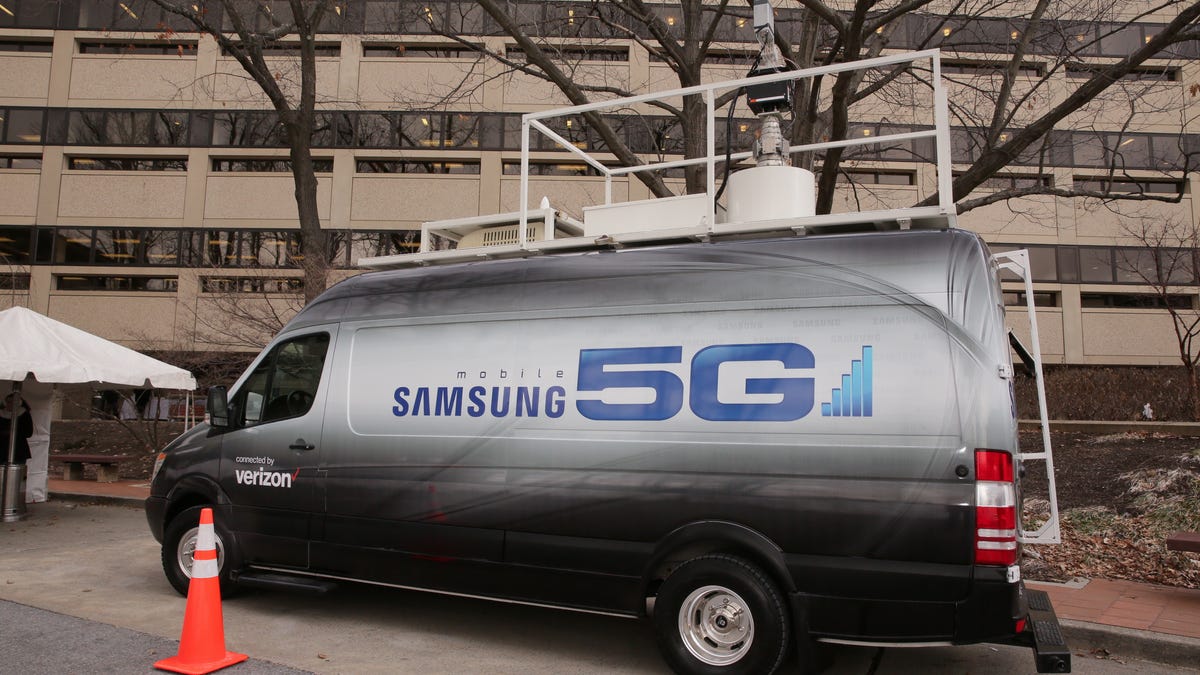Verizon offers taste of 5G as it expands network trials
The company plans to offer 5G to some customers in 11 cities by midyear. It's not full mobile wireless. Instead it's a replacement for fixed broadband.

An early 5G test vehicle parks outside Verizon headquarters.
We're slowly inching toward a super-connected 5G world.
Verizon said Wednesday it plans to offer "5G" service to some customers in 11 US markets by mid-2017, boasting that this rollout will be the largest proving ground yet for the next-generation wireless technology.
Certain "pilot" customers in Ann Arbor, Michigan; Atlanta; Bernardsville, New Jersey; Brockton, Massachusetts; Dallas; Denver; Houston; Miami; Sacramento; Seattle and Washington, DC, will get access to the technology, which promises to be 10 to 100 times faster than our speediest existing cellular connections.
Verizon's trials mark the latest development in 5G, a technology that promises to change our society by giving us super-fast, ubiquitous coverage and connecting everything from your car to you refrigerator. Verizon is one of many companies trumpeting its work in 5G. Because it's still early days, though, some of the developments can be categorized more as hype than as tangible benefits to the average consumer.
Wednesday's announcement, for instance, has its share of caveats. Verizon's 5G trial in the 11 markets isn't a truly mobile one. Instead, it's a substitute connection for your home or office broadband. With this service, you can scrap your DSL or cable box and the physical wires running into your home or building.
"The 5G systems we are deploying will soon provide wireless broadband service to homes, enabling customers to experience cost-competitive gigabit speeds that were previously only deliverable via fiber," said Woojune Kim, vice president of the Samsung team in charge of 5G and a partner for the Verizon deployment.
Also, good luck getting access to this test. Verizon said it will offer a network that will cover several thousand homes and businesses, but it's unclear how one gets chosen to be a pilot customer. The company will choose customers based on their proximity to the newly built sites.
Finally, the technology Verizon is employing isn't true 5G. The standards for the tech haven't been agreed upon by the international community yet. The company is hoping that by pushing forward with a working deployment, it can influence how real 5G will look in the future.
"5G technology innovation is rapidly evolving," said Adam Koeppe, vice president of network planning at Verizon.
Verizon isn't the only company racing toward 5G. AT&T already has a test running for 5G as a broadband replacement in an Intel office in Austin, Texas, and has tested its DirecTV Now video service over 5G in that city as well. The company also plans to start more fixed and mobile wireless trials in the second half of the year.
T-Mobile and Sprint, meanwhile, have started talking more about setting the foundation for 5G. The technology promises to be one of the hot topics at next week's Mobile World Congress trade show in Barcelona.

